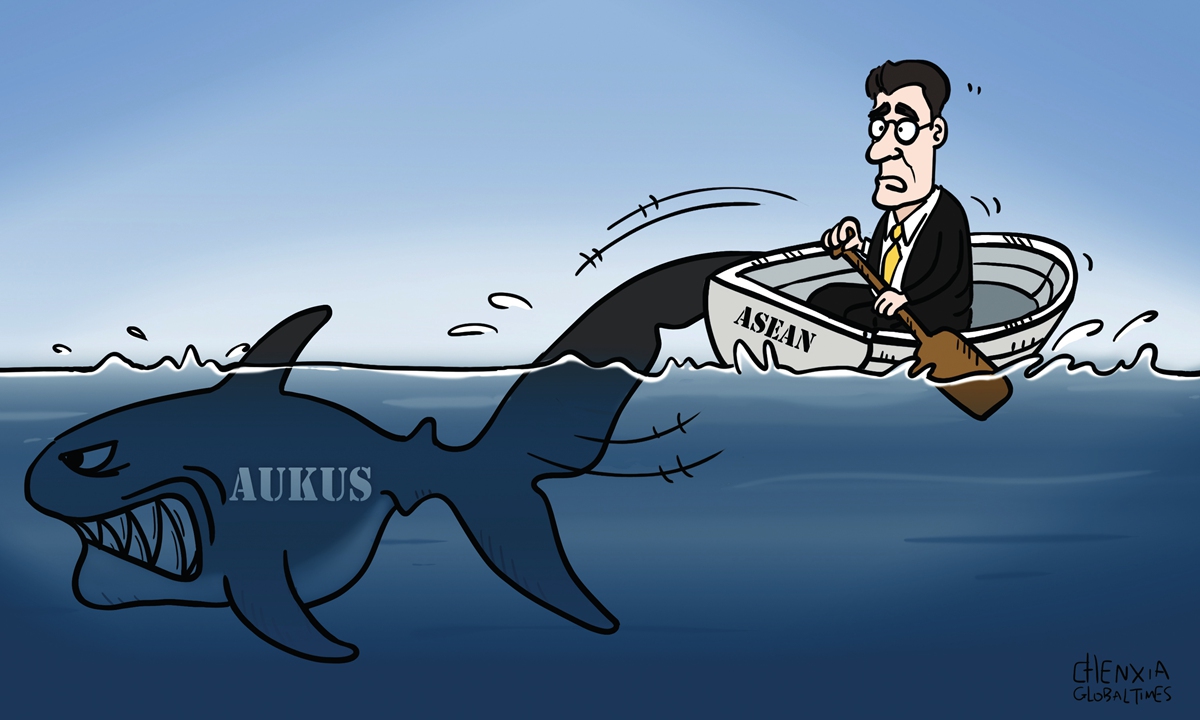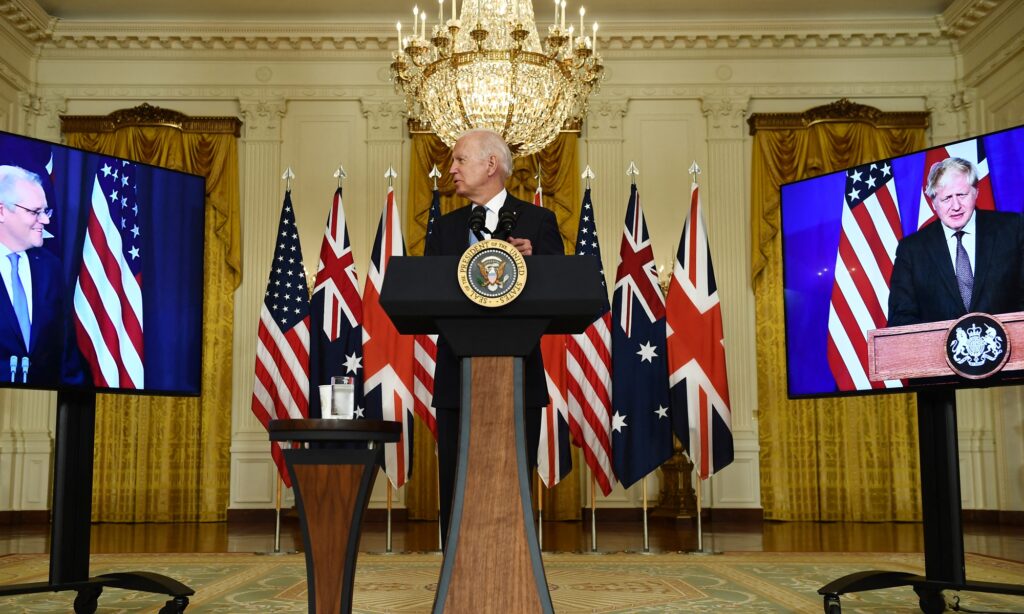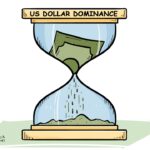Exactly one year ago, Australia, the UK and the US jointly unveiled the creation of their enhanced trilateral security partnership called “AUKUS.” Under their deal, London and Washington agreed to help Canberra build and operate Australia’s own fleet of nuclear-propelled submarines. One year on, as AUKUS is propagandized to respond to a so-called threat that does not exist at all, the group has been fueling the real threat of nuclear proliferation, arms race, and even war.
Whenever AUKUS is touched upon, there is an unavoidable issue that cannot be skirted around - the transfer of nuclear materials among the three countries is essentially nuclear proliferation, which is uncontrollable.
Australia, the UK and the US are all signatories to the Treaty on the Non-Proliferation of Nuclear Weapons (NPT). However, the three countries have ignored the AUKUS-related discussions at the International Atomic Energy Agency (IAEA) Board meetings and in relevant intergovernmental processes, while trying to set up a separate agenda on the issue, with the aim of whitewashing their proliferation activities.
But no matter what tricks they have tried hard to play, they cannot change the basic fact – the cooperation among the three countries involves the transfer of nuclear submarine power reactors and weapons-grade highly enriched uranium to non-nuclear-weapon states. It means Australia has the chance to use the uranium to develop and manufacture nuclear weapons. It also means other non-nuclear-weapon states may follow suit.
The NPT is one of the most crucial cornerstones of global security. Unfortunately, the wheels of AUKUS are scrunching it. “This sets a risky precedent since potential nuclear proliferators may use naval reactor programs as a cover for developing nuclear weapons and, with the AUKUS deal as a precedent, they may escape intolerable costs for doing so,” The National Interest magazine commented in its August issue. In other words, the byproduct of AUKUS will make the world sweat in the face of teetering security.
That’s why a meeting of the International Atomic Energy Agency (IAEA) Board of Governors on Monday decided by consensus to set up a formal agenda item on “Transfer of nuclear materials in the context of AUKUS and its safeguards in all aspects under the NPT.” It mirrors that the issue should not be handled by the three countries themselves alone, but must be handled jointly by the IAEA member states with due procedure. Wang Qun, China’s permanent representative to the UN in Vienna, said the move “foiled certain countries’ attempt to hijack the IAEA Board meeting,” and that it is the victory of the Vienna spirit over hegemonism.
The result fully reflects the concern of the international community on the transfer of nuclear weapons-grade materials involved in the cooperation of the three countries, and shows that the US-style collaboration among small circles is far from having popular support.
The unpopular side of AUKUS can also be found among Australia’s neighboring countries, especially among ASEAN.
Due to the AUKUS, ASEAN members are caught in a security puzzle where everyone feels at risk, because they will one day have to face a close and growingly aggressive neighbor whose military strength is boosting. The previous balance of power will be broken. They are pondering whether to enhance their own military arsenals as a response to potential danger. An arms race could be triggered at any time.
More importantly, if AUKUS yearns for sufficient follow-up development momentum in the Asia-Pacific region, it needs crises, turmoil and even conflicts. Without these, AUKUS has no “justified” cover to promote itself. But with the chaos, ASEAN will simply be stripped of development opportunities.
The existence of AUKUS itself is something that has jeopardized the security and well-being of all Indo-Pacific countries. Most ASEAN members are well aware of it. Their resistance and anxiety against AUKUS will only increase.

Illustration: Chen Xia/GT
In turn, regional countries’ opposition to AUKUS will have impact on the group’s development. AUKUS will still be promoted in years to come, but it may not succeed.
Not only do Australia’s neighboring countries have concerns, some Australians also raised their doubts over AUKUS. Australia “has never before placed itself at the forefront of US planning for a confrontation with a superpower. And it has never before gone so dramatically on the offensive in its weapons acquisition,” wrote Sam Roggeveen, director of the International Security Program of Sydney-based Lowy Institute. “This is a question not just of military strategy but of how Australia defines itself as an international actor, and as a nation.”
Former Australian diplomat Bruce Haigh tweeted in June, “AUKUS is all about the US using Australia to confront China.” But what has Canberra earned for joining the club? Apart from showing its naivety, all it gets is the risk of nuclear proliferation and more resentment from regional countries. On the surface, it may have obtained US’ assurance of security protection, but it also has turned itself into an arm of US Indo-Pacific Command, or even a US’ suicide squad – when war breaks out, Australia will bear the brunt first.
With so many negative AUKUS assets on its shoulders, ranging from self-interests to world security, if the current Australian administration is wise, it should start thinking of how to lead Australia out of this trap, dug by its predecessor, instead of plunging deeper.
(Global Times)




